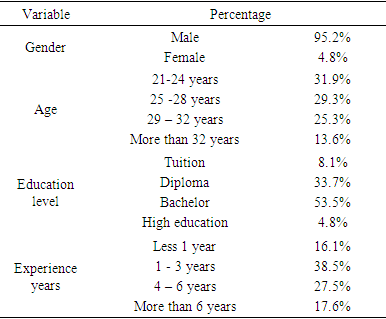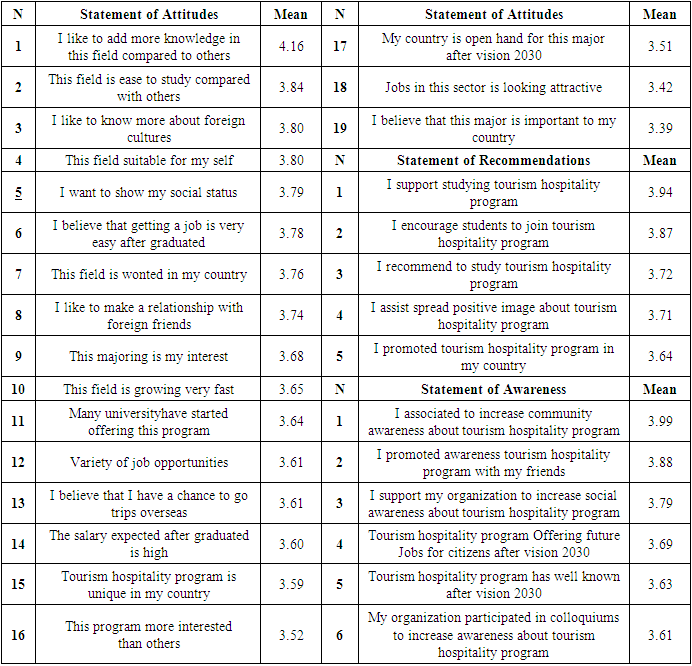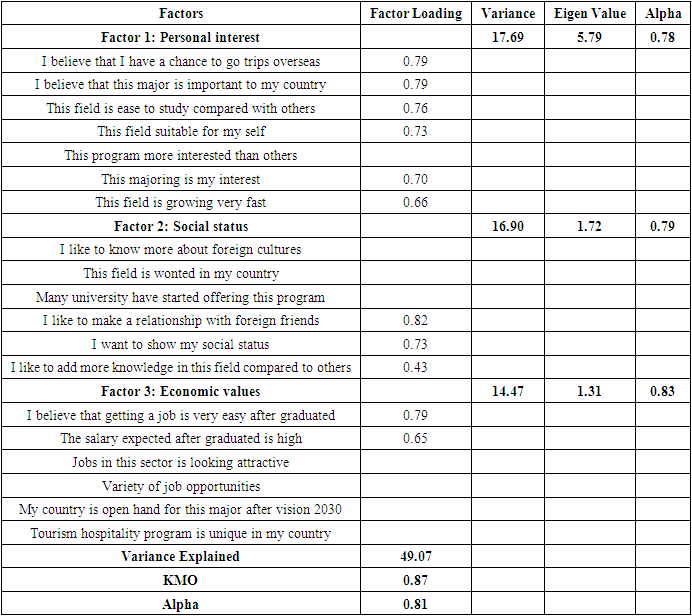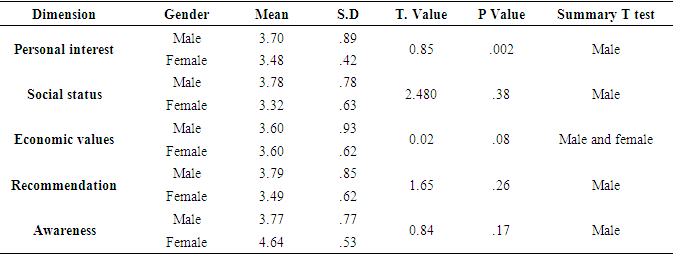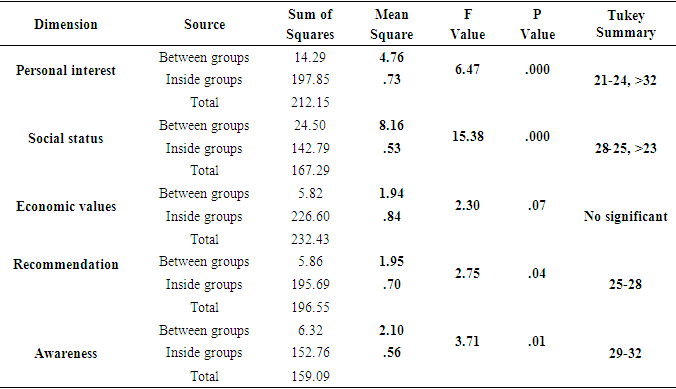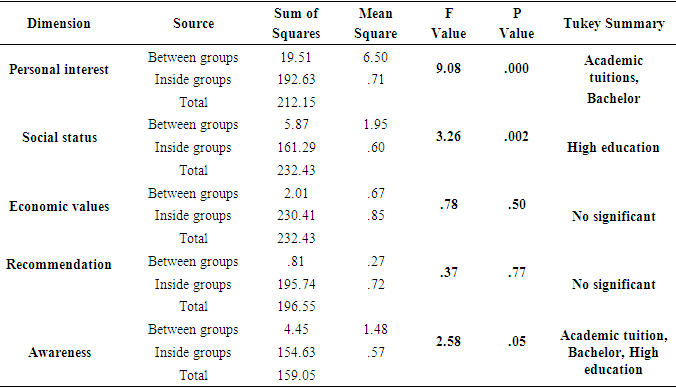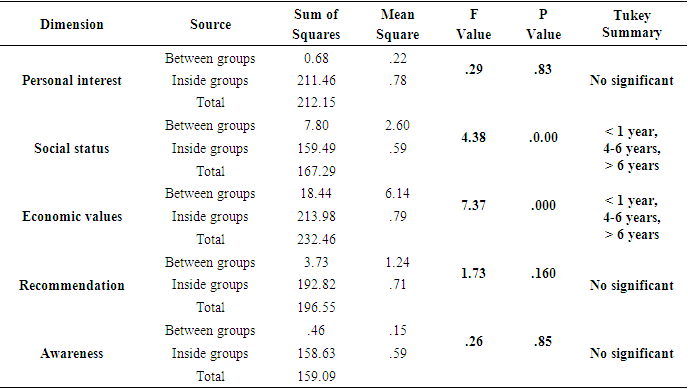-
Paper Information
- Paper Submission
-
Journal Information
- About This Journal
- Editorial Board
- Current Issue
- Archive
- Author Guidelines
- Contact Us
American Journal of Tourism Management
p-ISSN: 2326-0637 e-ISSN: 2326-0645
2023; 12(1): 19-28
doi:10.5923/j.tourism.20231201.03
Received: Apr. 19, 2023; Accepted: May 22, 2023; Published: Jun. 12, 2023

Measuring Attitudes, Recommendations, and Awareness of Graduates Studying Tourism Hospitality Program in Saudi Arabia
Bashar Alhaj
Tourism and Hotel Management, Faculty of Business Administration, Jazan University, Saudi Arabia
Correspondence to: Bashar Alhaj, Tourism and Hotel Management, Faculty of Business Administration, Jazan University, Saudi Arabia.
| Email: |  |
Copyright © 2023 The Author(s). Published by Scientific & Academic Publishing.
This work is licensed under the Creative Commons Attribution International License (CC BY).
http://creativecommons.org/licenses/by/4.0/

The Kingdom of Saudi Arabia has given more attention to the tourism sector, especially after the Crown prince's vision 2030 as a sector for development and creation of jobs to reduce unemployment among the country for Saudi citizens. However, the target size of Saudi labor in the tourism and hospitality sector is still scarce, while the majority of labor in the tourism sector is non-Saudis. The primary purposes of this study were to identify the attitudes of Saudi graduates about the tourism and hospitality program, and to investigate any statistical differences between attitudes, recommendations, and awareness for graduates of tourism and hospitality with demographic variables. This study used a sample of 273 practitioners in tourism and hospitality organizations. The results revealed that personal interest, social status, and economic values were the most critical factors affecting tourism and hospitality programs graduates. Also, the results of this study showed that they have strong awareness and recommendations about the tourism industry in the country. It illustrated some statistical differences between variables of graduates' attitudes and some demographic characteristics. Therefore, the study has some implications for attitudes guidance for tourism planners for future decisions.
Keywords: Tourism, Hospitality, Graduates, Saudi
Cite this paper: Bashar Alhaj, Measuring Attitudes, Recommendations, and Awareness of Graduates Studying Tourism Hospitality Program in Saudi Arabia, American Journal of Tourism Management, Vol. 12 No. 1, 2023, pp. 19-28. doi: 10.5923/j.tourism.20231201.03.
Article Outline
1. Introduction
- The tourism sector has become one of the essential drivers of many countries (Le et al., 2018). It is a crucial aspect of the Kingdom of Saudi Arabia. It is earning a lot of economic benefits to the country. According to Tourism Information and Research Center (MAS) 2017, tourism receipt records US Dollars 26.1 billion. Moreover, World Tourism Organization UNWTO (2019) records that Saudi international tourist arrival was 17.4 million and receipt US 16,382 million. For this reason, a lot of educational institutes and universities in the country have developed their education strategies to obtain new majors, especially in the tourism and hospitality industry. The results of the growth of tourism industries worldwide and in Saudi especially are demanded to provide qualified and skilled employees for huge enterprises under construction for the Crown prince’s vision 2030. The hospitality and tourism education in Saudi has spread since the present century. In this regard, Saudi education institutes have strived to increase the quality of students for future job demands (Alhaj Mohammad, 2013). Tourism in Saudi will be the first economic sector within vision 2030. Generally, education in tourism and hospitality is significant in providing employees for organizations in the industry (Cho and Kang, 2005; Kang et al., 2005). The importance of national employees for the tourism sector and organization has drawn one of the challenges that face jobs nationalization to provide tourism organization in the country. According to Saudi General Authority of Statistics (2017) stated that 22.3% percentage of Saudis work in tourism and hospitality organizations. According previous mention, the country witnessed growth in tourism education. The Saudi citizens recognized that the tourism and hospitality program is one variable that reduces unemployment. For this reason, tourism awareness is considered essential for tourism development. Alhaj Mohammad (2017) indicated that Saudi citizens have enough awareness about tourism and hospitality programs, especially for economic benefits and job opportunities. Measuring and evaluating the attitudes of Saudi graduates in the hospitality and tourism program is very useful for many reasons. First, it is given the nature of tourism and hospitality programs in the country. Second, determine the size of demand for employees in the field in the future. Third, build a bridge between tourism education institutions and stakeholders regarding information about the tourism hospitality program, and the investigation may affect the recruitments strategies in Saudi within vision 2030.According to Duman et al. (2006), studying tourism and hospitality programs will help students build the future of their careers. These beliefs came from their knowledge and faith in the significant tourism and hospitality sector that offer many job opportunities. In this regard, numerous studies on tourism and hospitality programs from different aspects such as perceptions, motivations, and studying tourism hospitality abroad such as (Amissah et al., 2020; Bury, 2020; Shyiu and Tanwar, 2020; Bontenbal and Aziz, 2013; Seyfi et al., 2019; Le et al.2018; Jamnia and Pan, 2017; Rahimi and Akgunduz, 2017). However, there is still a gap regarding attitudes of Saudi graduates in tourism and hospitality programs. In particular, inquiries regarding this topic have been unclear for many past years until now. Thus, the primary purpose of this study is to fill the gap in this area. The objectives of this research are: 1) Identifying the attitudes of Saudi graduates about tourism and hospitality programs. 2) Knowing graduate recommendations for studying tourism and hospitality program for students in the future 3) Knowledge of the awareness of Saudi graduates about tourism and hospitality programs 4) Explore the graduated attitudes about careers in tourism and hospitality programs in the country. 5) Are there any statistically differences between "attitudes, recommendations, and awareness" for tourism and hospitality graduates with demographic variables.
2. Literature Review
- Different researches have been conducted on tourism and hospitality programs from various aspects. Some of them involved students' motivations to choose this area (Shyiu and Tanwar, 2020; Jamnia and Pan, 2017); student's perceptions of careers (Amissah et al., 2020); stakeholder's perspectives (Le et al., 2018), also social status and expectation salary (Penny Wan et al. 2014). All of the previous studies on this topic have focused on offering better education for students and lecturers in the field (Kim and Jeong, 2018). However, because of the importance of the tourism sector today, many universities update their education policies to meet this development (Alhaj Mohammad, 2013). International tourism hospitality has been recognized as a fast-growing industry (Korpi and Mertens, 2004). In this regard, this growing field requires a lot of human capital to fill the recruitment of this organization in terms of quality and quantity (Jiang and Tribe, 2009).Thus, Penny Wan et al. (2014) examines the effects of students' perceptions of the nature and social status of work in the tourism and hospitality industries. The results indicated that the perceived nature of the work had no significant relationship with career prospects. Still, the nature of the work was an important factor contributing to the perceived social status of the industry. Amissah et al. (2020) studied students' perceptions of hospitality and tourism in Ghana, the result indicated that students have bad expectations about the tourism and hospitality careers. Also, the findings showed significant factors students should consider in their careers choices, such as the opportunity to care for others, establish their jobs, gain transferable skills, further training, and education.Similarly, According to Bontenbal and Aziz (2013) studied the careers perception of Omani students. The study also covered their motives, future expectations, and opinions about working in this field. The results indicated that the tourism and hospitality industry in Oman still meets some challenges for labor faced in the sector, and it is one of the career choices in the country.Different researches illustrate motivations for studying tourism hospitality programs. Rahimi et al. (2018) found that seeking a better life and the nature of the program are the most critical factors that drive students to study this program in the United Kingdom. Similarly, shyjo and Tanwar (2020) noted five factors that attract students in India: knowledge enhancement, foreign exposure, recommendations, affordability, and job opportunity. In this regard, students believe that tourism and hospitality programs offer them wide career options in their future (Tukamushaba and Xiao, 2012; Alhaj Mohammad, 2013; Kim et al., 2007). Similarly, Mak and Barry (2014) found that personal interest was one of the most important factors to choose a hospitality tourism program. The results revealed that students have strong in pursuing careers in aviation and theme park management. Therefore, attractiveness was one of the important factors for students in Uganda to study tourism hospitality programs, followed by a job opportunity, foreign experience, ease of study, internal locus of control, and external influence (Tukamushaba and Xiao, 2012). Finally, enormous numbers of students join tourism hospitality programs everywhere (Shyju and Tanwar, 2020). Generally, the tourism and hospitality industry is important from the economic side (Korpi and Mertens, 2004). For these reasons, a problem arises regarding the demand and supply of human resources in tourism and hospitality organizations (Kumar, 2018). Many universities and academic institutions are offering tourism and hospitality programs (Alhaj Mohammad and Alsaleh, 2013; Kim et al., 2007). From a stakeholder perspective, tourism and hospitality organizations seek to recruit quality human resources for the long-term (Le et al. 2018); for example, students after graduation from hospitality and tourism programs work for organizations in the field like hotels, travel agencies, and entertainment (Charles and McCleary, 1997).
3. Research Methodology
- Sample and dataThis research adopted a quantitative method to achieve research objectives. It involved a questionnaire survey collecting the data from respondents because it's helpful in a large population and easy to save time. The population of this study was all graduated from tourism and hospitality management in Saudi. Before disturbing the questionnaire, the respondents were asked if they graduated from the hospitality and tourism program to ensure the sample was representative and actual. Research instruments To achieve research objectives, the researcher used the quantitative approach method and adapted a questionnaire to collect the data from respondents. The questionnaire of this study was built based on previous literature (Amissah et al. 2020; Bury, 2020; Shyju and Tanwar, 2020; Alhaj Mohammad, 2017; Bury; and Oka, 2017; Lee and Joung, 2017; Jamnia and Pan, 2017; Rahimi and Akgunduz, 2017; Mak and Barry, 2014; Bontenbal and Aziz, 2013; Alhaj Mohammad, 2013; Tukamushaba and Xiao, 2012; Kim et al. 2007) and the others developed by the researcher to be relevant for the study. In this study, the primary data were derived from a questionnaire, a suitable instrument from previous literature that studied similar topics. The research tool is divided into four sections arranged as follows: first section, the attitude of graduated students on the hospitality tourism program about this major. The respondents were asked about some statements related to measuring their attitudes such as “I believe that getting a job is very easy after graduating “, “This field is growing very fast“, “This program more interested than others“, and “My country is open hand for this major after vision 2030“.The second section includes some statements related to respondents about a recommendation to study this program. It contains statements such as “I recommend to study tourism hospitality program“, “I encourage students to join tourism hospitality program“, and “I promoted tourism hospitality program in my country “. The third section is related to the awareness of graduated students about the hospitality tourism program. In this section, the respondents were asked about statements such as “I associated to increase community awareness about tourism hospitality program“, “Tourism hospitality program offering future Jobs for citizens after vision 2030“, and “Tourism hospitality program has well known after vision 2030“. At the same time, the last section includes some demographic variables of respondents such as age, gender, education level, and experience years. The first three parts were measured on a 5-point-Likert scale ranging from 1 (strongly disagree) to 5 (strongly agree), and the demographic profile the respondent has chosen appropriate choice.Pretest the research instrument Before involving actual respondents and the field of study, pre-test analysis was used to test the reliability and validity of the research instrument. Reliability can be improved by using a pre-test or pilot version of a measure. Developing one or more drafts or preliminary versions of a measure and trying them before applying the final version is helpful for researchers (Neuman, 2006). Cooper and Schindler (2001) stated that a pilot study is conducted to detect weaknesses in design and instrumentation and provide proxy data to select probability samples. Evaluating a research plan can involve both informal and formal procedures. Formally, it may be field-tested in a preliminary pilot study. It should be reviewed and critiqued (Gay and Diehl, 1996). Pre-test should be directed at a representative sample of the population and should be selected in the same fashion as is intended for the final survey (Babbie, 1973, p.211). In addition, Cooper and Schindler (1996) stated that there are several variations in pilot testing. Some of them are intentionally restricted to data collection activities. One form, pre-testing, may rely on colleagues, respondent surrogates, or actual respondents. The Author used a reliability test by the pilot study to test the questionnaire instrument before embarking on the actual survey. The purposes were to ensure whether the items in the questionnaire were reliable to actual respondents and whether they clearly understood the questionnaire's items. This pilot study was conducted in May 2021 Saudi Arabia Jazan Governorate. Forty questionnaires were distributed, returned 34, and 29 usable questionnaires were analyzed with a percentage from the total pilot study (72%). Moreover, the researcher tested the reliability of the questionnaire through Cronpach's Alpha to ensure the reliability of respondents' answers to all statements of the research instrument. The results were measured based on Cronpach's Alpha: 1) attitudes of graduated tourism hospitality program 0.85, 2) recommendation of graduated tourism and hospitality for other people to study this major Alpha was 0.83, and 3) awareness of graduated tourism and hospitality program about this major in the country yielded 0.81.Experts made some amendments in tourism and hospitality to increase the questionnaires' validity. The wording of items was amended to be straightforward to understand. A minor modification was done to demographic variables and questions relating to graduation. The respondents spent 3 - 5 minutes filling out the questionnaires in the pilot study. Finally, in concerned to data collection, the questionnaire was distributed to the respondents through both face to face and using online survey with time limitation started from June until August 2021.Data analysisTwo hundred seventy-three questionnaires were collected from the respondents. The collected data were analyzed using the Statistical Package of Social Science (SPSS) in many statistical tests in terms of data analysis. Attitudes of graduates about tourism hospitality program items were ranked in terms of importance to understand which items score in each factor of respondents' attitudes. The principal component factor analysis was applied in this part of data analysis, and factors with eigenvalues greater than one were reported in the final factor structure. Only items with factor loadings greater than 0.4 were retained for each factor grouping. Regarding recommendations and awareness of graduates' tourism hospitality program, the collected data items were computed in one variable to test with demographic variables. Finally, frequencies and descriptive analysis were applied to describe the characteristics of respondents of the study. The data collection process by visiting tourism organizations and a face-to-face personal survey was used as a form of data collection. The respondents were asked before they filled up the research instrument. Research assistants conducted the survey instrument at Jazan city and some Governorates under Jazan region in the south part in the Kingdom of Saudi Arabia in 2021 and Riyadh. The researchers and research assistants visited the areas mentioned earlier and tourism organizations at different times and dates to avoid bias.
4. Discussion the Results
- Table 1 below shows that most respondents were male, 95.2 percent, and the remaining were female, 4.8 percent. The findings of this study are in contrast with Amissah et al. (2020), who found that female students have stronger intentions to work in the industry than male students. This is because the tourism and hospitality sector is still new in the country, and the country opens hands for developing this sector and major in the education universities and training centers. Therefore, most workers in the tourism and hospitality jobs were boys. The results illustrated that more than half of the respondents were between 21 – 28 age group percent 61.2. It is also clear evidence that tourism and hospitality major is new for the country, so still few of waves and numbers who graduated from education organizations then join workplaces. More than half of respondents percent 53.5 have Bachelor's degree level education, and they have 1 – 6 years of experience percent 65.3. It means that after graduation from study time, they go up to work field with limited experience years due to new major in the country as mentioned earlier.
|
|
|
|
|
|
|
5. Conclusions
- Regarding to the results and conclusions of several previous studies on students' attitudes in hospitality and tourism programs, it can be concluded that; personal interest, social status, and economic values considered the main factors to analyze the attitudes, recommendations, and awareness of graduates studying tourism hospitality program. This study is conducted in Saudi Arabia, which is located in the Middle East. The country is open for tourism and hospitality, especially after the Crown prince's vision 2030. According to previous studies outcomes, students' attitudes and motivation were the main objectives to study hospitality and tourism programs (Amissah et al., 2020; Shyju and Tanwar, 2020; Rahimi et al., 2018; Alhaj Mohammad, 2017; Bury; and Oka, 2017). In Saudi, there is still a scarcity of studies related to hospitality and tourism programs to understand the attitudes of graduates about this industry. The study revealed that hospitality and tourism graduates in Saudi perceived numerous benefits that affected them to study this program. Moreover, they had sharp intension, awareness and recommendations for their friends and relatives to study this program in the future.The primary purpose of this study was to measure graduates’ attitudes toward tourism and hospitality programs in Saudi Arabia. Data was collected from different hospitality and tourism organizations in the country to achieve research objectives. Moreover, the factor analysis results indicated that three graduate dimensions divided into three factors personal interest, social status, and economic values. The sample of this study has an advanced attitude about the tourism and hospitality industry in the country, and they believe that the tourism sector is one of the required fields that attract Saudi citizens for future jobs. Also, the respondents were asked about recommendations and awareness for the tourism and hospitality industry. It was further revealed that tourism and hospitality programs in Saudi have a substantial effect on graduates for the factors indicated above. In addition, the overall perception of graduates of tourism and hospitality careers in Saudi is beneficial. This explains why students have a strong awareness about the field, and they positively recommend their friends and relatives to join tourism and hospitality programs for studying.Moreover, in contraire of the conclusion of Amissah et al., (2020), it can be revealed that in Saudi situation there are interested from both governmental and private sectors to motivate and enriched student’s attitudes to join the tourism and hospitality carriers’ bath. In line with Alhaj Mohammad and Alsaleh (2013) found that providing job opportunities in tourism and hospitality industry were considered the main important factor that influencing students to join this field. So that, this is the case of the country of Saudi Arabia in the current era where the national vision 2030 and strategies oriented by supporting the role of the industry in the national economy. The results of this study are clear confirmation that the tourism and hospitality industry is one of the important fields in the country. Although the subject of this study has received wide attention worldwide, it is still there is a gap in Saudi tourism literature regarding measuring graduates' attitudes toward tourism and the hospitality industry. The findings are very helpful for education institutes, planners, and industry decision-makers in the country to improve the essence of tourism and hospitality education and outcomes in Saudi to be one of the top destinations to attract foreign students. From a marketing perspective, the government of Saudi Arabia should open a hand for international universities and academics to motivate them to invest in the country that’s will develop the nature of the tourism and hospitality sector in Saudi and fill market share requirements from human capital instead of international workers. This is one of the main purposes of the ministry of labor to increase localization jobs.Finally, the study has several recommendations: Firstly, Increase promotional campaigns to reorientation citizens to new careers in the industry. Secondly, it was revealed that a minority of female students are in the field, motivating female students to join in hospitality and tourism programs in the country. Thirdly, encourage the private sector for more investment in the hospitality industry, especially in hospitality services such as food and beverage and culinary.
 Abstract
Abstract Reference
Reference Full-Text PDF
Full-Text PDF Full-text HTML
Full-text HTML